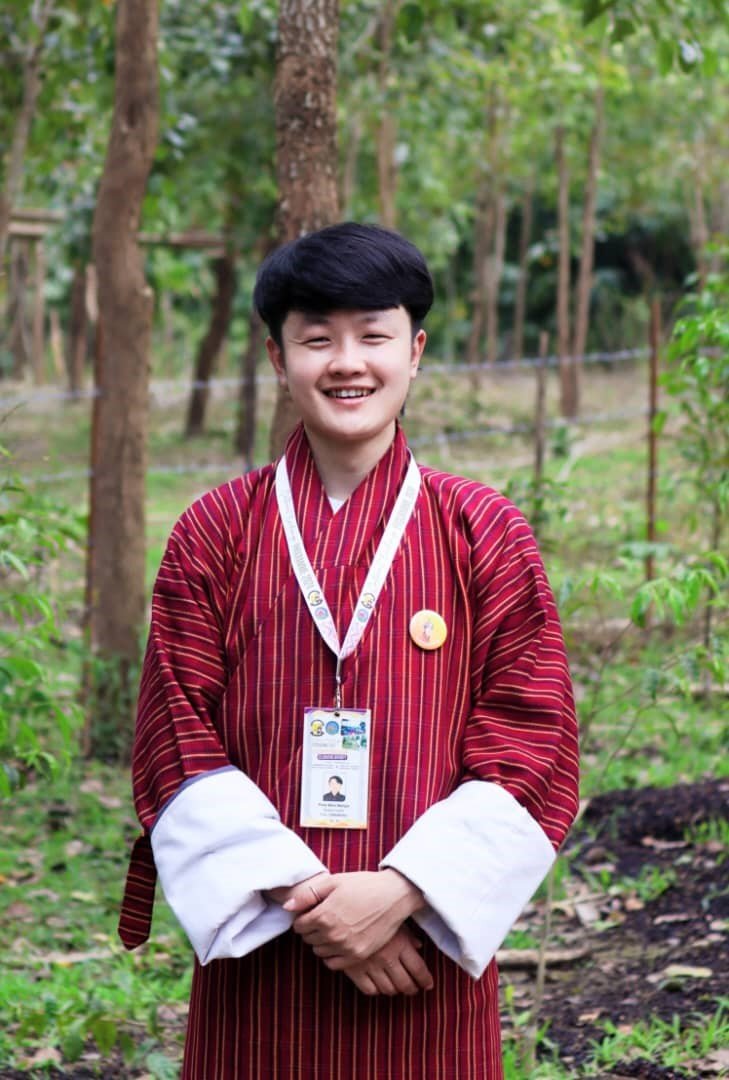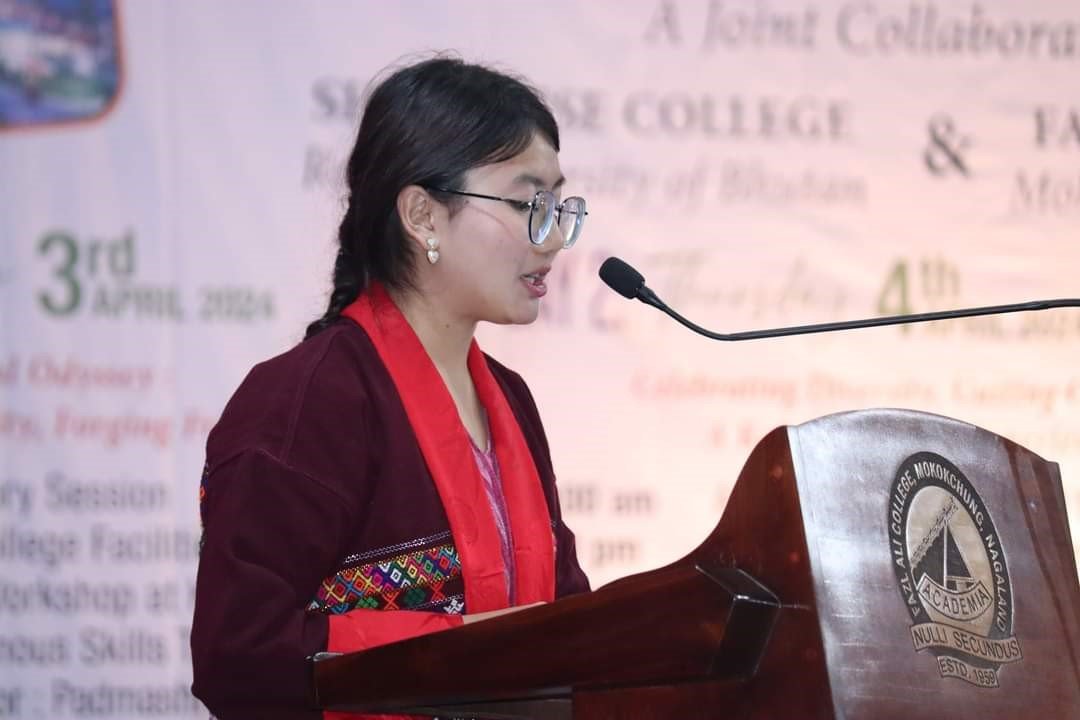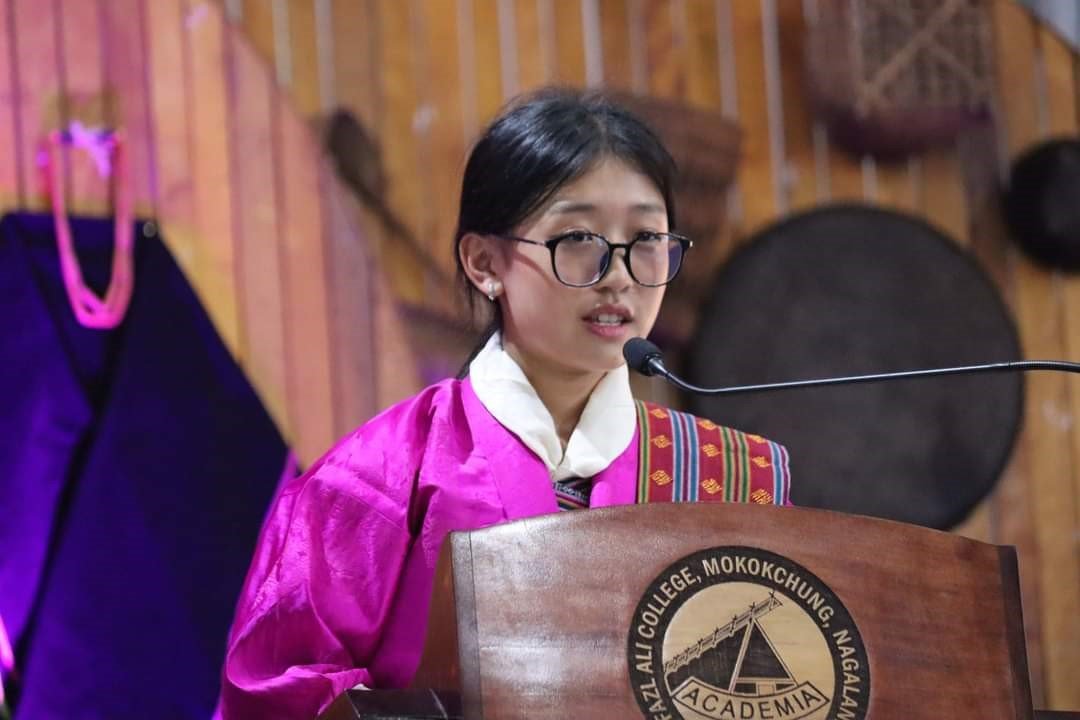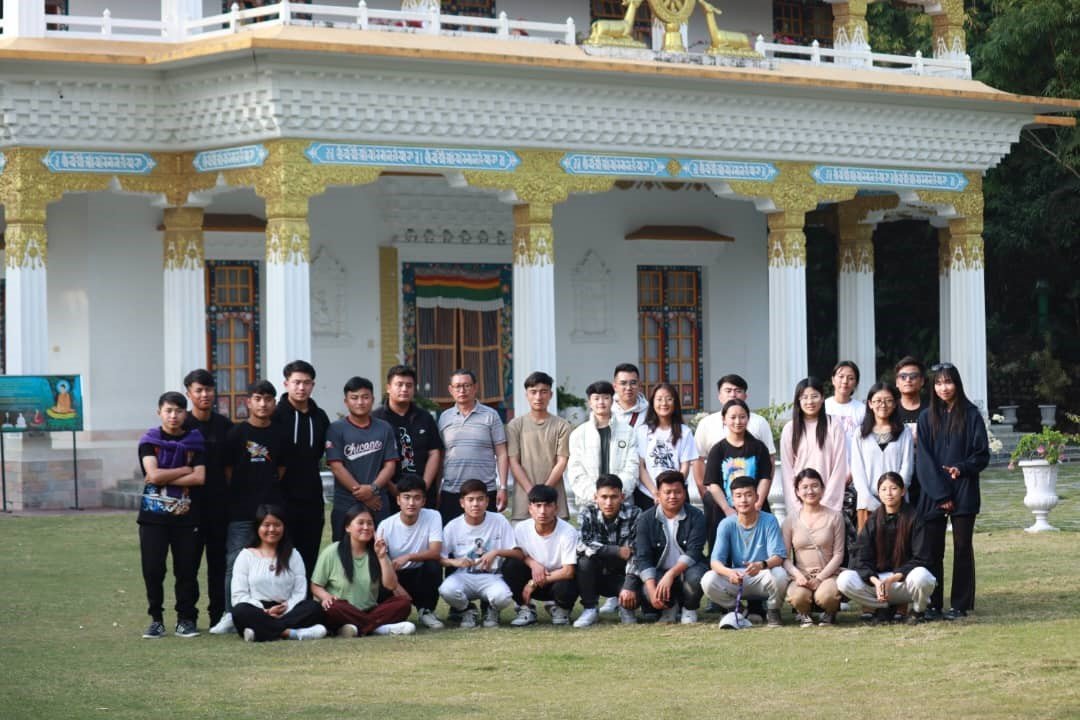The district of Mokokchung in Nagaland witnessed a “Cultural Exchange Program” between Sherubtse College, Royal University of Bhutan, and Fazl Ali College from April 3 to 5 at Fazl Ali College, fostering bonds and celebrating diversity.
A delegation of thirty student leaders and two faculty members from Sherubtse College, Royal University of Bhutan, attended the Cultural Exchange Program. They shared the quotation, “United in tradition, bonded by community, the families of Nagaland embody the strength of diversity and the warmth of shared heritage.”
Three student leaders from Sherubtse College, Prem Mani Mongar, Needup Pelmo, and Kuenga Tshomo Dorji, share their insightful reflections on their experiences during this enriching journey with Nagaland Tribune.
NT: What aspects of the cultural exchange program have you found most enriching and why?

Prem Mani Mongar: The most enriching aspect of this program has been the opportunity to connect with students and faculty at FAC. Hearing their perspectives on life in Nagaland and sharing stories about Bhutan has provided me with a greater sense of understanding and camaraderie that transcends borders. It’s been a beautiful exchange of cultures and bonding friendship.

Needup Pelmo: The cultural exchange program has been a valuable experience, allowing me to immerse myself in a different cultural setting, understand different perspectives, and appreciate diversity.
Kuenga Tshomo Dorji: Participating in the Ketsangriju cultural workshop was incredibly enriching as we witnessed firsthand the intricate process of crafting bamboo ornaments and furniture. This hands-on experience allowed us to appreciate the craftsmanship and skill involved in creating these traditional items. Additionally, during the cultural day celebration, delving into traditional dances and songs provided us with a deeper understanding of Nagaland culture and fostered a sense of connection with our hosts.
NT: What cultural similarities have you noticed between Bhutan and Nagaland during your time at Fazl Ali College?
Prem Mani Mongar: There are many! Both our cultures place a strong emphasis on respect for elders, community spirit, and celebrating traditions. The warmth and hospitality I’ve experienced at FAC remind me a lot of Bhutanese people.
Needup Pelmo: Despite the geographical distance, I’ve noticed cultural similarities between Bhutan and Nagaland, such as a strong sense of community and respect for traditions.

Kuenga Tshomo Dorji: Throughout our time at Fazl Ali College, we noticed several cultural similarities between Bhutan and Nagaland. One striking similarity was the unification of different communities, reflecting a shared emphasis on unity and inclusivity.
NT: Can you share a memorable experience or interaction you’ve had with students or faculty at FAC that has left a lasting impression on you?
Prem Mani Mongar: Going to the Etibens Tower with my friends and listening to the story of Etiben and Jina has been really beautiful. All my newfound friends are too generous and kind enough to explain everything in particular. Bhutanese people back home are also very generous, but seeing much more generous friends here made me feel like home.
Needup Pelmo: A memorable experience was joining a traditional Naga meal with FAC students. It was a genuine interaction where we shared stories and laughter, fostering a sense of camaraderie.
Kuenga Tshomo Dorji: One memorable experience at FAC was the opportunity to make friends with both students and faculty. The warmth and hospitality extended to us left a lasting impression, and for me reinforced the importance of human connection and cross-cultural friendships in enriching experiences like these.
Download Nagaland Tribune app on Google Play

NT: How has your perception of Nagaland changed since arriving at FAC and experiencing life here?
Prem Mani Mongar: Before coming here, I knew Nagaland for its rich history and beautiful landscapes. But experiencing the rich culture, the warmth of the people, and the energy at FAC has been truly eye-opening. It’s a place full of life, tradition, and a strong sense of community.
Needup Pelmo: My perception of Nagaland has shifted positively since arriving at FAC. I’ve gained a deeper understanding of Naga culture and traditions, dispelling any misconceptions I may have had.
Kuenga Tshomo Dorji: Since arriving at FAC, my perception of Nagaland has undergone a positive transformation. The hospitable nature of the people and the delightful experiences shared here have challenged any preconceived notions I may have had, fostering a greater appreciation for the cultural diversity and warmth of the community.
NT: What aspects of Bhutanese culture did you hope to share with the students and faculty at FAC during your cultural showcase?
Prem Mani Mongar: I was excited to showcase Bhutanese folk dances, music, and some traditional Bhutanese dances. I also wanted to share stories about our unique festivals and the importance of Gross National Happiness (GNH) in Bhutanese culture.
Needup Pelmo: During the cultural showcase, I planned to share Bhutanese traditions like our traditional dances, food, and values like environmental conservation and community harmony.
Kuenga Tshomo Dorji: I hoped to share aspects of Bhutanese culture such as our diverse attire and the traditional methods of demarcating rank bearers. By showcasing these cultural elements, we could promote cross-cultural understanding and appreciation among the students and faculty at FAC.
NT: Have you encountered any surprising differences in customs or traditions between Bhutan and Nagaland? If so, could you share an example and how you’ve navigated these differences?
Prem Mani Mongar: One difference is the use of spoons in Bhutanese meals. Traditionally, we also eat with our hands but due to modernization it’s changing. Here, meals are typically eaten with hands. I’ve learned to adapt and appreciate the different dining customs.
Needup Pelmo: I encountered surprising differences in social customs, such as greeting etiquette and communication styles, but navigating these differences with respect and curiosity has been an enriching learning experience.
Kuenga Tshomo Dorji: One surprising difference we encountered between Bhutan and Nagaland was in religion. While both regions have rich cultural and firm believers of their own religions, the specific practices and beliefs may differ. Navigating these differences required open-mindedness and respectful engagement, ultimately enriching our understanding of both cultures.
NT: What are some key lessons or insights you’ve gained from participating in this cultural exchange program between Sherubtse College and Fazl Ali College?
Prem Mani Mongar: This program has shown me the power of cultural exchange in breaking down stereotypes and gaining deeper understanding. It reminded me of the importance of celebrating our unique identities while also recognizing the shared values that connect us as human beings.
Needup Pelmo: Participating in this cultural exchange program has taught me the importance of empathy, communication, and embracing diversity in fostering meaningful connections across cultures.
Kuenga Tshomo Dorji: Participating in this cultural exchange program has taught me valuable lessons about the universality of human values and the significance of cultural diversity. Despite differences in customs and traditions, we share fundamental values that unite us as human beings.
NT: Could you tell us about any unexpected discoveries or insights you’ve gained about life in Mokokchung and its community during your visit?
Prem Mani Mongar: The passion for music and dance in Mokokchung has surprised me. There’s a strong music scene here, and I’ve enjoyed discovering age-old musical traditions. It’s another way our cultures connect through artistic expression.
Needup Pelmo: An unexpected insight was the close-knit nature of the Mokokchung community and their pride in preserving their cultural heritage, which has deepened my appreciation for their way of life.
Kuenga Tshomo Dorji: An unexpected discovery during our visit to Mokokchung was the striking similarity in our way of life despite coming from different cultural backgrounds. This realization underscored the universality and human bond that transcends cultural boundaries.
NT: As someone who has immersed themselves in both Bhutanese and Nagaland cultures, what advice would you give to future students participating in similar exchange programs?
Prem Mani Mongar: Come with an open mind and a willingness to learn! Embrace the differences, ask questions, and actively participate in the cultural exchange. You’ll not only learn about another culture but also gain a deeper understanding of your own.
Needup Pelmo: To future students in similar exchange programs, I recommend approaching the experience with an open mind, respect for differences, and a willingness to learn from each other’s cultures.

Kuenga Tshomo Dorji: For future students participating in similar exchange programs, I would advise coming prepared with an open mind and a willingness to immerse oneself fully in the host culture. Embracing cultural differences with curiosity and respect can lead to transformative experiences and meaningful connections.
In their final remarks, the student leaders from Sherubtse College expressed gratitude for the invaluable lessons learned and the friendships forged during the cultural exchange program. They commended the warmth and hospitality of the local community, noting the fond memories created. Additionally, they marveled at the richness of the culture, which left a profound impact on them stating “the people here are so lovely and the rich culture left us all in awe.”

